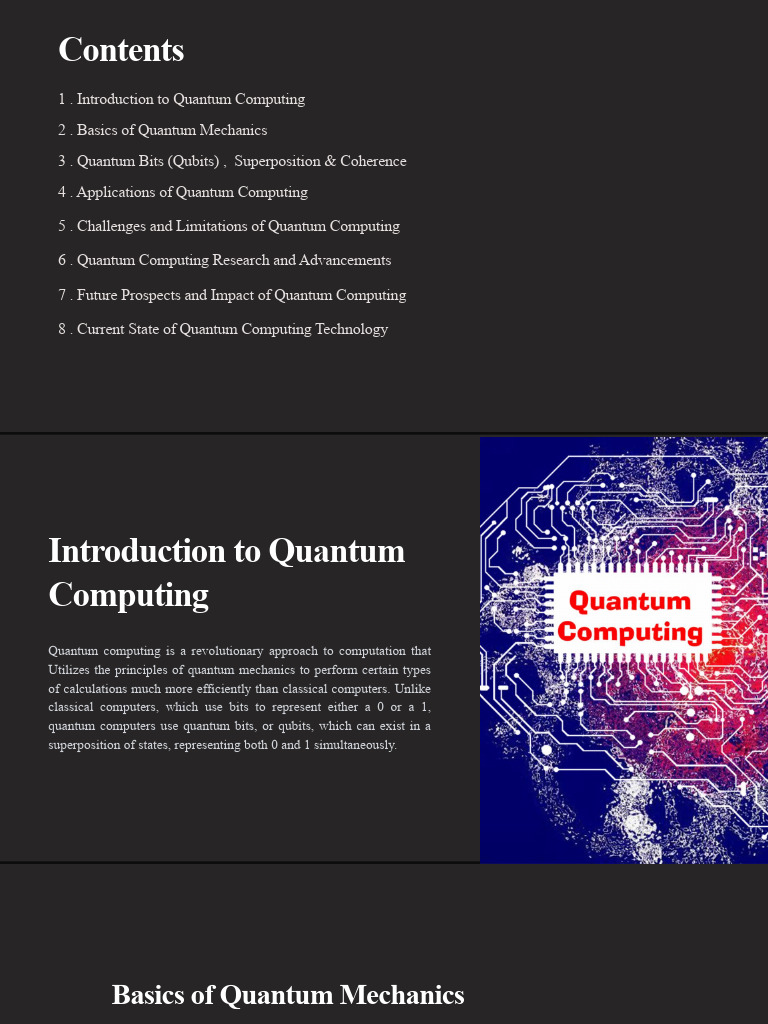Quantum computing represents a paradigm shift in our understanding of computation, merging the realms of physics and computer science in novel and transformative ways. As this field burgeons, aspiring researchers must possess an insatiable curiosity and a structured approach to navigate its intricacies. This article elucidates a stepwise methodology for embarking on research in quantum computing while igniting a sense of wonder about its vast potential.
1. Grasping Fundamental Concepts
To lay a solid foundation, one must first delve into the elementary principles of quantum mechanics. Understanding concepts such as superposition, entanglement, and the uncertainty principle is crucial. Superposition allows a quantum bit, or qubit, to exist in multiple states simultaneously, a stark contrast to classical bits which represent either 0 or 1. This characteristic underpins the exceptional computational capabilities of quantum systems. Moreover, grasping entanglement, where qubits become correlated such that the state of one instantaneously influences another, unveils the potential for unprecedented parallelism in computing tasks.
Engaging with foundational texts and lecture notes from reputable institutions can solidify these concepts. Many universities now offer free online courses, providing an accessible entry point for novices eager to understand the quantum realm.
2. Exploring Mathematical Frameworks
A pivotal aspect of quantum computing research is the mathematical language that articulates its principles. Proficiency in linear algebra, probability theory, and abstract algebra is essential. These mathematical tools not only facilitate the comprehension of quantum mechanics but also empower researchers to formulate and manipulate quantum algorithms.
Linear algebra, particularly, lays the groundwork for understanding quantum states and operations. The representation of quantum states as vectors in Hilbert space and quantum operations as matrix transformations is foundational in developing quantum algorithms. Resources such as textbooks on quantum mathematics or online platforms like edX and Coursera can offer structured learning paths.
3. Delving Into Quantum Algorithms
Once a firm understanding of the fundamentals and mathematics is attained, aspiring researchers should immerse themselves in the various quantum algorithms that illustrate the power of quantum computing. Renowned algorithms, such as Shor’s algorithm for integer factorization and Grover’s algorithm for unstructured search, exemplify how quantum computing can outperform classical counterparts.
Analyzing these algorithms not only provides insight into their operational mechanics but also sparks curiosity about the implications of quantum supremacy. For researchers, this stage serves as a launching pad to develop original quantum algorithms or to enhance existing ones, thereby contributing to the body of knowledge in the field.
4. Engaging with the Physics of Quantum Systems
Quantum computing is inextricably linked to the physics of quantum systems. Researchers should familiarize themselves with the physical realizations of quantum computers, such as superconducting circuits, trapped ions, and topological qubits. Understanding the experimental challenges and technological advancements in these areas is paramount.
Attending seminars, conferences, and workshops can provide firsthand exposure to the latest developments in quantum hardware. Engaging with the scientific community fosters collaboration and dialogue, which are invaluable for budding researchers aiming to contribute meaningfully to the evolving landscape of quantum technology.
5. Mastering Quantum Programming Languages
As with classical computing, proficiency in programming is indispensable for quantum computing research. Familiarization with quantum programming languages such as Qiskit, Cirq, or Q# is essential. These languages enable researchers to construct quantum circuits and simulate quantum algorithms on classical platforms.
Practical exercises in quantum programming not only reinforce theoretical understanding but also cultivate problem-solving skills. Engaging in hackathons or online challenges can further enhance programming capabilities while fostering a sense of community amongst peers.
6. Collaborating with Interdisciplinary Teams
Quantum computing transcends traditional disciplinary boundaries, intertwining physics, computer science, and engineering. Thus, researchers should actively seek collaboration with experts from various fields. Interdisciplinary approaches can yield innovative insights and methodologies that propel research efforts forward.
Establishing connections with researchers in related domains, such as cryptography, artificial intelligence, or materials science, can unveil novel applications for quantum computing. By engaging in collaborative projects or joint research endeavors, one can gain access to diverse perspectives that enrich the research experience.
7. Staying Abreast of Current Research
The field of quantum computing is rapidly evolving, with new discoveries and developments unfolding regularly. Keeping abreast of current research through scholarly journals, preprint repositories, and academic conferences is crucial. Platforms such as arXiv, IEEE Xplore, and journal subscriptions provide avenues for discovering cutting-edge research.
Moreover, participating in discussion forums and online communities dedicated to quantum computing can serve as valuable resources for exchanging ideas and staying informed about recent advancements. Engaging with thought leaders in the field can ignite inspiration and foster a sense of belonging within the research community.
8. Pioneering Original Research
As knowledge and skills accumulate, researchers should aspire to identify unique questions and challenges within the realm of quantum computing. Original research ventures may involve developing new algorithms, enhancing quantum error correction techniques, or exploring innovative applications of quantum technologies.
Publishing findings in reputable journals not only contributes to the academic discourse but also establishes a researcher’s identity in the field. Engaging in peer review processes and sharing insights through presentations fosters further growth and collaboration, solidifying one’s role as an active participant in the pursuit of quantum understanding.
Conclusion: Embracing the Quantum Frontier
The journey into quantum computing research is one laden with challenges and rewards. By cultivating a strong foundational knowledge, harnessing mathematical frameworks, and engaging with interdisciplinary teams, one can delve deeply into this intriguing domain. This exploration not only contributes to personal academic growth but also advances our collective understanding of the universe, promising technological revolutions that may redefine the very fabric of society. As this field unfolds, it invites passionate minds to push the boundaries of what we comprehend, fostering a perpetual state of curiosity and innovation at the quantum frontier.












